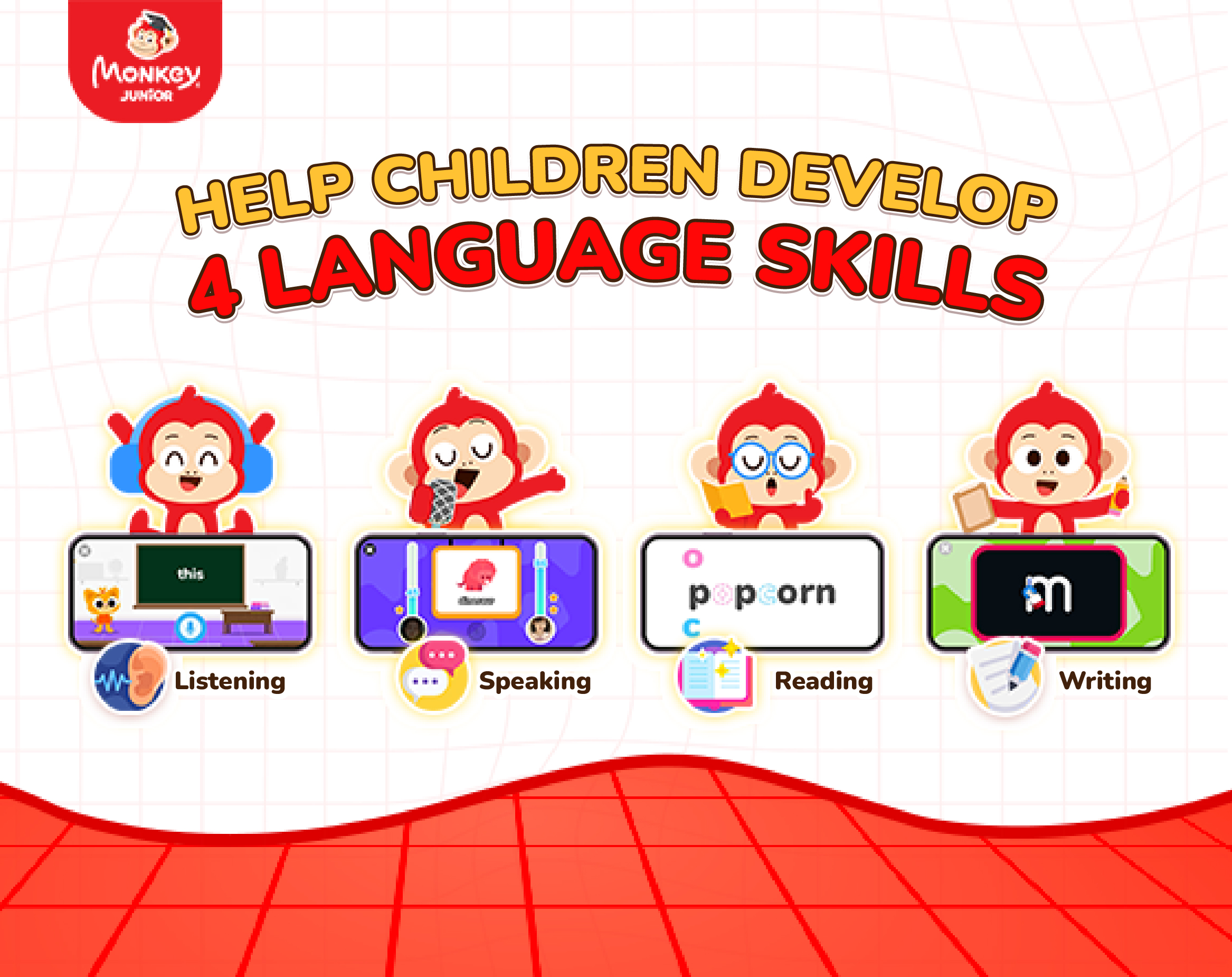Are you wondering how to study English effectively with your child? Helping young learners grasp a new language can be a fun and rewarding journey. This article explores 5+ simple yet highly effective methods specifically designed for children, making the learning process engaging and successful. Discover practical ways to kickstart your child's English adventure today!
A child's mindset when learning a language other than their mother tongue
Children approach language learning with a mindset that is fundamentally different from that of adults. Their brains are highly plastic, meaning they are naturally equipped to absorb new sounds, structures, and meanings without the self-consciousness or analytical overthinking that often hinders older learners. This innate curiosity, combined with a fearless willingness to experiment, allows them to acquire a second language through play, repetition, and immersion - often without even realizing they are “studying”.
Despite this advantage, children still encounter certain challenges when learning a language other than their mother tongue. These include limited exposure outside structured learning environments, possible interference from their native language, and a lack of motivation if the learning materials aren’t engaging. Emotional factors such as shyness or fear of being misunderstood can also create silent barriers that slow down progress.
Understanding how to study English effectively from a child’s perspective involves more than just providing lessons - it’s about cultivating a language-rich environment that feels safe, stimulating, and fun. Parents should integrate English into a child’s daily life through storytelling, music, interactive games, and visual content. Apps and platforms that combine educational value with playful design can be especially powerful, as they align with how children learn best, through curiosity, driven exploration and consistent exposure.
Ultimately, nurturing a positive emotional connection to the language is just as important as teaching grammar or vocabulary. When children associate English with joy, discovery, and success, their motivation grows organically, and with it, their fluency.

Simple and effective how to study English methods for children
Here are 5+ simple and effective methods for children on how to study English:
1. Learning English through bilingual stories
One of the most effective and enjoyable ways for children to learn a new language is through bilingual stories. These stories present content in both the child's native language and English, allowing them to naturally make connections between vocabulary, sentence structure, and context. This side-by-side learning approach not only supports comprehension but also builds confidence as children begin to understand and use new words in real-life scenarios.
When exploring how to study English with young learners, bilingual stories offer a balanced blend of familiarity and challenge. The native language provides a safety net, while the English version introduces new linguistic patterns in a non-intimidating way. Repetition of phrases, visual storytelling, and engaging plots further enhance retention, making it easier for children to absorb language organically.
One excellent resource that brings this method to life is Monkey Stories - a trusted educational platform offering a rich library of interactive bilingual stories, audiobooks, and learning games. With Monkey Stories, children can explore hundreds of beautifully illustrated tales in both English and their native language, helping them develop listening skills, pronunciation, and reading comprehension in a fun, stress-free environment.
To maximize the benefits of bilingual stories, parents and educators can read along with children, encourage them to retell the story in their own words, or use accompanying audio features to reinforce pronunciation. Over time, this method not only improves vocabulary but also nurtures a love for reading - core elements in any successful strategy for how to study English.

2. Practicing pronunciation through English songs
Pronunciation is one of the most essential yet challenging aspects of language learning for children. A fun and highly effective way to improve pronunciation is through English songs. Songs provide repetitive, rhythm-based exposure to authentic language use, helping young learners naturally pick up intonation, stress patterns, and correct articulation without the pressure of formal instruction.
When considering how to study English with children, music becomes a powerful tool. Catchy melodies and memorable lyrics make it easier for kids to mimic sounds and remember phrases. In fact, many studies show that children who sing in a second language often develop better pronunciation and listening skills than those who only engage in traditional learning methods.
Parents and teachers can integrate English songs into daily routines - whether it’s singing along during playtime, watching lyric videos, or using educational apps that feature music-based learning. Encouraging children to sing aloud not only enhances pronunciation but also boosts confidence and listening comprehension. This playful approach helps create a relaxed environment where children are more likely to experiment with the language.

3. Learning anytime, anywhere with online English learning software
In today’s digital age, one of the most flexible and accessible ways for children to learn English is through online learning software. These platforms allow young learners to study anytime, anywhere - whether at home, in the car, or during free time between school and other activities. With engaging content, interactive lessons, and gamified experiences, children stay motivated while developing key language skills such as vocabulary, listening, reading, and pronunciation.
When exploring how to study English effectively, online software offers a dynamic solution that adapts to each child’s learning pace and style. Many platforms include personalized learning paths, progress tracking, and built-in rewards, which help children stay focused and excited about their progress. The flexibility also means that English can be woven into a child’s daily routine without pressure or strict schedules.
Apps like Monkey Junior are excellent examples of this method in action. Designed specifically for early learners, Monkey Junior offers a comprehensive and structured English learning program through engaging lessons, videos, and fun mini-games. It focuses on helping children build foundational skills in vocabulary and pronunciation from the very first stages of learning.

4. Actively reading and taking notes on new vocabulary as soon as you see it
One of the most overlooked but powerful techniques in language learning is active reading combined with vocabulary note-taking. When children are encouraged to write down new words immediately as they encounter them, whether in stories, songs, or everyday conversations, they begin to take ownership of their learning process. This habit helps build stronger memory connections and improves long-term vocabulary retention.
For parents and educators exploring how to study English effectively with children, encouraging active engagement with new words is key. Rather than passively reading or listening, children who stop to jot down unfamiliar vocabulary, and ideally, review it later are more likely to remember and use those words. This method also builds early habits of self-directed learning, a valuable skill in mastering any language.
To make the process fun and sustainable, children can keep a personal “word journal” or vocabulary notebook, decorated and organized in their own way. Adding pictures, sample sentences, or even translations can make each word more meaningful and easier to recall. Over time, this simple yet structured approach forms a solid foundation for growing a usable English vocabulary.
Incorporating active reading and note-taking into daily English learning routines is one of the most practical and effective ways to study English methods, especially for young learners who benefit from repetition, creativity, and hands-on activities.

5. Participating in English speaking clubs or friend groups
Interaction is a key component in language acquisition, especially for young learners. Participating in English speaking clubs or friend groups offers children a fun and social way to practice what they’ve learned in real-life situations. These settings create a low-pressure environment where kids can communicate freely, build confidence, and correct their mistakes naturally through peer feedback and support.
When looking for how to study English methods that actually work, speaking practice in group settings stands out. Unlike passive learning methods, speaking clubs actively engage children in listening, thinking, and responding in English. This not only strengthens their speaking and listening skills but also develops social interaction and cultural understanding.
Parents can encourage participation by enrolling their children in community-based English clubs, online conversation groups, or even organizing informal speaking sessions with friends who are also learning English. The consistency of these interactions helps children see English as a living language, not just a school subject.
Whether it's role-playing, storytelling, or simple daily conversations, group practice makes learning English more enjoyable and meaningful. It’s a highly effective and socially enriching way for children to explore how to study English while forming lasting friendships and communication skills.

6. Learning English through online and offline games
Learning through play is one of the most engaging and effective ways to teach children a new language. Both online and offline games provide interactive, fun, and immersive ways for kids to practice English while enjoying themselves. Whether it’s word puzzles, memory games, or language challenges, games encourage active participation and help reinforce vocabulary, grammar, and pronunciation in an enjoyable, stress-free environment.
When thinking about how to study English in a way that captivates children, using games is a top choice. Online platforms like Monkey Junior combine a rich library of interactive mini-games, quizzes, and story-based challenges that adapt to each child’s level, making learning both personalized and motivating. Meanwhile, offline games, such as vocabulary card matching or board-game adaptations, promote social interaction, teamwork, and communication skills, all while enhancing language comprehension.
Games also create opportunities for repetition, a key factor in language retention. Through consistent practice in a playful setting, children become more confident in using new vocabulary and sentence structures. Additionally, many games are designed with age-appropriate content, ensuring that children are exposed to the language in a way that matches their learning level.
Incorporating both online tools like Monkey Junior and traditional offline games into English learning routines is an easy and enjoyable way to teach children how to study English effectively. Games transform learning from a chore into a fun, interactive experience that keeps kids excited about expanding their language skills.

Notes for parents when guiding their children on how to study English
As parents, guiding your child through the process of learning English can be both exciting and challenging. To ensure their success, it's important to adopt a supportive and patient approach. Here are some key notes for parents to consider when helping their children with how to study English effectively:
-
Set realistic expectations: Learning a new language takes time. It's important to set achievable goals and celebrate small milestones along the way. Patience is key to preventing frustration and fostering a love for learning.
-
Create a fun learning environment: Children learn best when they are engaged and having fun. Incorporate games, songs, and interactive activities into their study routine. Online platforms like Monkey Junior offer engaging and interactive lessons that keep children motivated while they learn.
-
Practice consistently: Consistency is crucial in language learning. Encourage daily practice, even if it's for short periods. Regular exposure to English, whether through reading, speaking, or listening, will help reinforce what they learn and build confidence.
-
Focus on communication: Don’t focus too much on perfection. Encourage your child to communicate in English, even if their grammar or pronunciation isn't perfect. The goal is for them to practice speaking and become comfortable using the language.
-
Be involved in their learning journey: Take an active interest in your child's learning progress. Ask about their lessons, listen to them practice speaking, and help with homework or assignments. Your involvement will show them that learning English is important and fun.
By following these simple tips, parents can make a significant impact on their child’s language learning journey and help them understand how to study English effectively.

In conclusion, understanding how to study English effectively for young learners is about making the process enjoyable and integrated into their lives. The six methods we've discussed offer diverse, accessible ways to build foundational skills. By incorporating these simple techniques, you empower your child with valuable language abilities that will benefit them for years to come.




.png)





